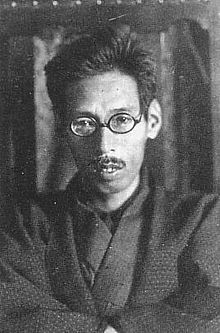Satō Haruo
Satō Haruo ( Japanese 佐藤 春 夫 ; born April 9, 1892 in Shingū , Wakayama Prefecture ; † May 6, 1964 in Tokyo ) was a Japanese poet, narrator and essayist.
Satō is an honorary citizen of his hometown Shingū.
Life
Satō came from a family of doctors. Soon he joined the Myōjō group of poets around Yosano Akiko and her husband Tekkan . Because of Nagai Kafū who taught at the Keiō University , he enrolled in 1910 at this, but left it again without a degree. Like the circle of poets, his work was determined early on by the lyrical-romantic tone. He found his first recognition with his fairytale story Supein inu no ie (1916 "The House of a Newfoundlander").
In the story Den'en no yūutsu (1919, "rural melancholy") and the thematically subsequent novel "Tokai no yūutsu" (1922, metropolitan melancholy ), the bourgeois intellectual's weariness with life is depicted. Satō's work essentially revolves around the private sphere and the life weariness of intellectuals. More rarely, as in Baishōfu Mari (1924, "The Prostitute Mari"), social problems are discussed.
Prizes and awards
- 1949 Nihon Suiri Sakka Kyōkaishō ( 日本 推理 作家協会 賞 , Mystery Writers of Japan Awards )
- 1960 Order of Culture
literature
- S. Noma (Ed.): Satō Haruo . In: Japan. An Illustrated Encyclopedia. Kodansha, 1993, ISBN 4-06-205938-X , p. 1321.
Web links
Individual evidence
- ↑ 佐藤 春 夫 . In: デ ジ タ ル 版 日本人 名 大 辞典 + Plus at kotobank.jp. Kodansha, 2009, accessed February 2, 2012 (Japanese).
- ↑ 佐藤 春 夫 . In: 世界 大 百科 事 典 第 2 版 at kotobank.jp. Retrieved July 18, 2012 (Japanese).
- ^ A b Jürgen Berndt: Satō Haruo . In: Gerhard Steiner, Herbert Greiner-Mai , Wolfgang Lehmann (ed.): Lexicon of foreign language writers . tape 3 . Bibliographisches Institut Leipzig, Leipzig 1977, p. 238 .
| personal data | |
|---|---|
| SURNAME | Sato, Haruo |
| ALTERNATIVE NAMES | 佐藤 春 夫 (Japanese); 潮 鳴 (writer's name, Japanese); 沙塔 子 (writer's name, Japanese); 能 火 野人 (stage name, Japanese) |
| BRIEF DESCRIPTION | Japanese lyric poet, storyteller, and essayist |
| DATE OF BIRTH | April 9, 1892 |
| PLACE OF BIRTH | Shingū , Wakayama Prefecture |
| DATE OF DEATH | May 6, 1964 |
| Place of death | Tokyo |

